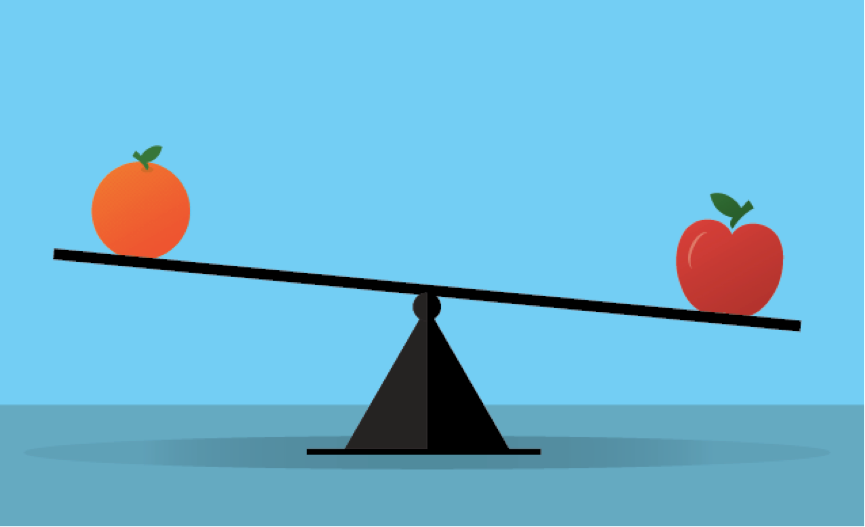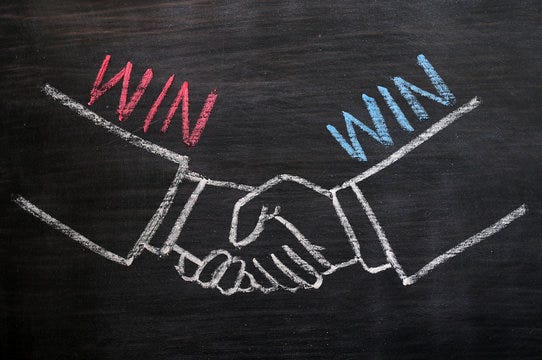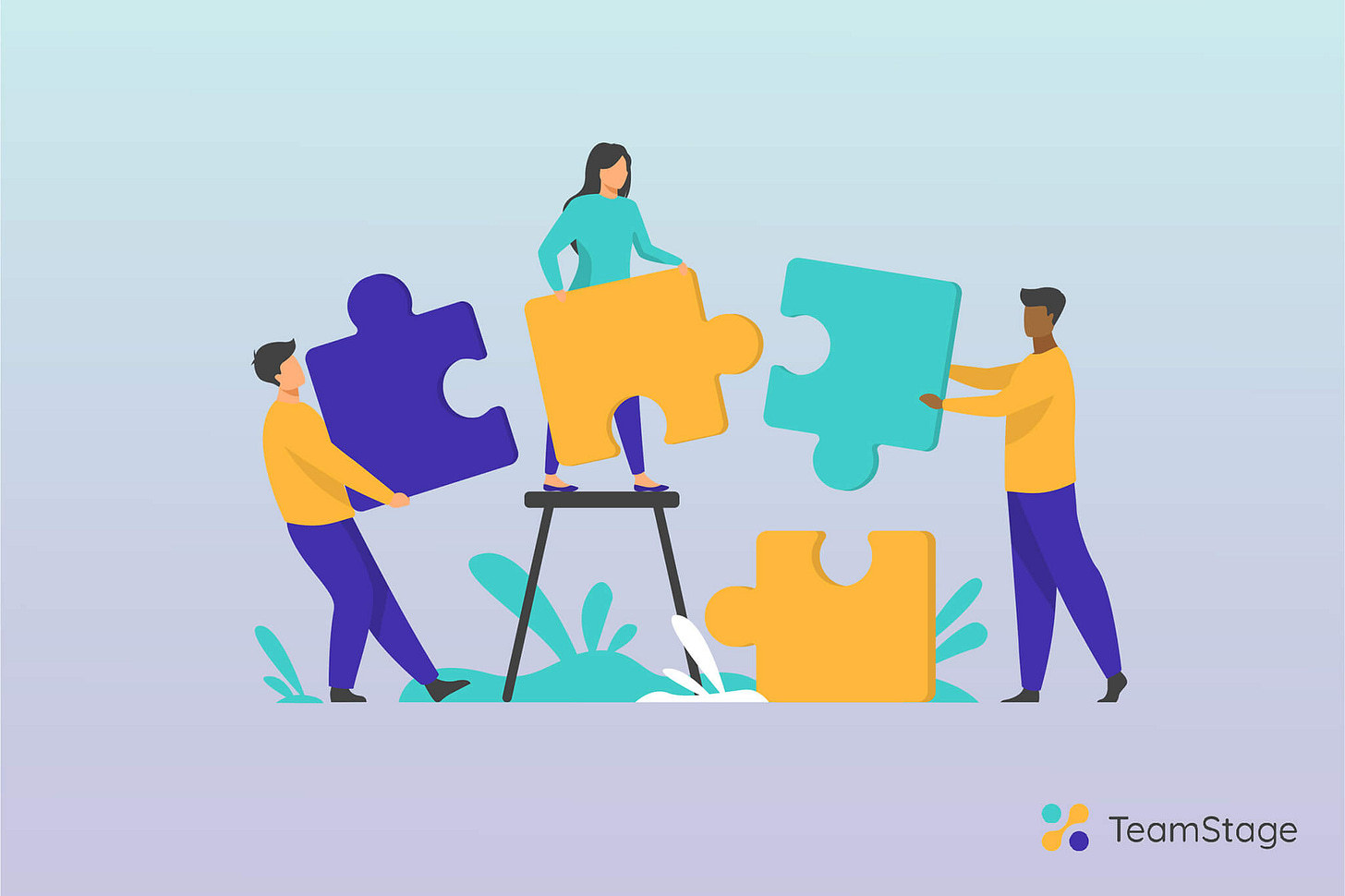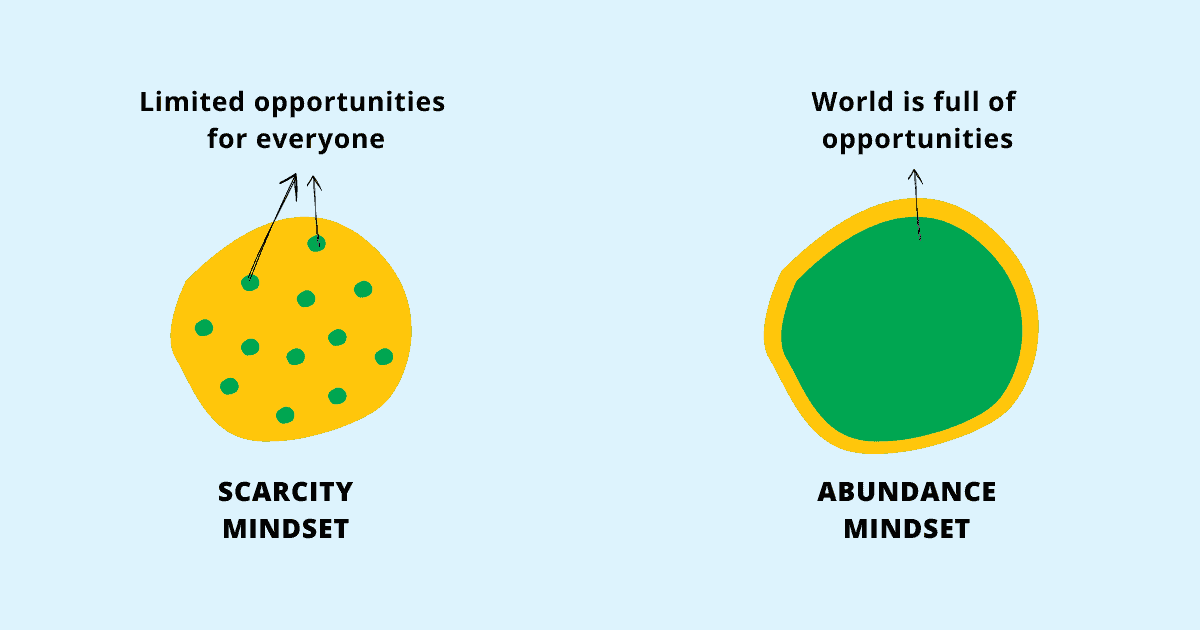How often do we think about the other person’s point of view during an interaction? “As long as I get what I want, I am happy” That’s the mindset a lot of us carry. For example, when you are trying to hang out with a friend, you may request that he picks you up from your house. He is reluctant about the inconvenience but picks you up because he is your friend. At the moment, you are happy that you didn't need to go through the trouble of going to his house or somewhere else in the middle. Is that right? Maybe this time, it seems fine. But, what if your friend starts saying no to hangouts because of the lack of inconsideration on your part? What if he’s tired of being the one making all the effort? That would be a huge long-term loss right? You won in the short term but lost in the long term. That’s what a Win/lose mindset gets us.
Don’t worry, you are not going to lose your friend, at the end of this post, you will be able to see this same situation through a win/win lens.
Welcome
Hi friends, welcome back to my newsletter. In this post, I will be discussing the habit called “Think Win-Win” (habit #4/7) from The 7 Habits of Highly Effective People by Stephen R. Covey. This habit is the first of the “Public Victory” habits. Habits 1, 2, and 3 (see previous newsletters) are part of the “Private Victory” habits. These habits lead you to become a principle-centered, proactive, independent person (you succeed with your capabilities). However, as the book suggests, to achieve true effectiveness, one needs to learn to be interdependent (succeed by combining your capabilities with other people). The next 4 habits (4-7) are focused on achieving great interdependence.
Excuse the (necessary) blurb, let’s talk about thinking Win/Win.
By the way, if you are short on time and plan on skimming, I highly recommend you read these two sections: “Why think win/win” and “The Abundance Mentality” (scroll down)
What does “think Win/Win” mean?
Think win/win is a frame of mind and heart that deals with human interactions. Win/win means that both parties are happy with a compromise or decision, mutually beneficial. That means neither you nor your friend needs to make the long, inconvenient trip, yet still hang out.
Most of us think in Win/Lose
There are 5 other paradigms of human interaction in addition to win/win. They are win/lose, lose/win, lose/lose, win, no deal. Most people tend to think win/lose in daily interactions and negotiations. For example, in class, the top scorers are rewarded, which says “If I win, you lose.” Generally, a 65 is a pretty bad grade and many would be upset by getting such a grade. However, if the class average is 40 and you got a 65, you’re thinking “Oh wow, I did good compared to everyone else.” That’s a win/lose paradigm at play. We often define our success and happiness through a comparison with others. In the classroom, this mindset leads to competition among classmates rather than collaboration. If everyone worked together instead of trying to beat each other, all their grades would be up. You would win and they would win.
Most people also tend to think in terms of dichotomies such as strong or weak, hardball or softball, etc. These are fundamentally wrong because they are based on position and power rather than on principles.
The other paradigms
Lose/win: Some people are programmed to lose/win, which says “Go ahead, have your way with me.”
Lose/lose: this is the result of two win/lose people getting together. They can’t get to a compromise.
Win: is a common mentality, which says as long as I get what I want, I don’t care about how you deal with your ends. They don’t necessarily want others to lose, they don’t consider the other party.
No deal: when there is no compromise, no one loses or wins.
Should you always think win/win?
Even though win/win is the best form of interaction, it may not always be the best option. All 6 paradigms still apply in different situations in life. For example, if someone is upset about something, it’s more considerate to be sincere and listen to them instead of asserting your principles on them (lose/win). In a sports game, if you win the other team loses (win/lose). You don’t consider how they can win. However, in scenarios that deal with interdependence and collaboration like at school, teams, and relationships, Win/Win is the best. Now, let’s see why…
Why think “Win/Win”?
Suppose company A is trying to sell a new product to company B. On the higher end, the product is around $80k in the market, company B is willing to pay around that much. Company A believes their product is the best in the market and they charge $100k. Company B thinks that’s way too much. Company B needs the product and understands that this particular product is really valuable.
Here, company A could eventually close the deal for $100k and make a great profit. Company A would win hugely, and Company B would walk back like they lost the bargain despite carrying the valuable product in their hands. Company A applied the Win/Lose paradigm. It seems like they were on the successful end of the deal, they won. However, think about it, even though they won in the short term, do you think Company B will want to come back to Company A for further business? Would they recommend company A to other companies? Probably not.
This would hurt Company A in the long term. They wouldn't get as many sales, lose customers, and lose their network with company B and similar companies.
Now, let’s consider the same situation with Win/Win. Company A could have offered the product for $100k; however, with a 2-month warranty. They are considering how Company B could also win in this negotiation. By selling the product for $100k, they win a huge profit, but they also provide a valuable warranty to Company B, who would benefit from such a perk.
Result: Company B signs the deal and walks out happily and develops a strong relationship with Company A. They come back to Company A for future deals and even recommend similar companies to do business with Company A. In this case, both companies benefit hugely. Company A especially benefits in the long term. There is mutual benefit in the interaction.
I hope you realized that it is much more beneficial to ensure that both parties of a compromise walk out happily, as it can create long-term opportunities and invaluable relationships.
Although, the above example was a simplified version, most of us aren’t selling products to companies every day. So, let’s think about win/win in a more relevant situation…
The same approach can be applied in school. For example, instead of thinking about “competing” with your classmates and friends for a higher grade/rank/position, think about how you can collaborate with them to achieve greater success. Maybe you can get by on your own and achieve A’s, but what happens when you need your classmate's help before a really difficult test? It might be hard for you to reach out for their help and they might be hesitant in helping. If you had cooperated previously, you would have built a strong relationship. Internalize this mindset before you start the new school year in less than a month. Cultivating a win/win mindset in school can not only improve your learning and grades but also your relationships with fellow students. If everyone is thinking of “collaboration”, not competition, positivity is radiated. Let yourself be the spark that ignites the fire.
When you are communicating with someone, whether it be a friend, partner, or parent, think about how the decision can benefit you and them. Think from their frame of mind and how they can benefit from that decision. In relationships of any kind, win/lose is ultimately lose/lose. If your loved one is losing, then it’s a loss for you.
Let me bring something eye-opening to your attention.
The Abundance Mentality (READ THIS!! The key to human happiness)
A character trait essential to Win/Win is the abundance mentality, which says that there is plenty out there for everyone. Most people (including myself) are deeply scripted into the Scarcity Mindset. They see life as having only so much as if there is only one pie out there. If someone got a big portion of the pie, everyone else would have to get less.
People with a scarcity mindset have a difficult time sharing recognition, power, and profit. They also have a hard time being genuinely happy for other people’s successes and sometimes even their family members, friends, or close ones. “It’s almost as if something is being taken from them when someone receives special recognition or a windfall gain or has remarkable success or achievement. Although they might verbally express happiness for others' success, inwardly they are eating their hearts out. Their sense of worth comes from being compared, and someone else’s success, to some degree, means their failure.” They want other people to be the way they want them to be.
My Insights
Almost every single word above speaks to me, especially me in the past. At school, I had a hard time sharing recognition and power with other students. I burnt inside when I wasn’t the one standing on the podium to give the valedictorian speech. I always struggled to be genuinely happy for my friend’s successes. When other people succeeded at something that I also participated in, I would feel envious and threatened. My happiness, for a long time, came from comparison with other people. On the flip side, the comparison robbed my happiness more often.
I shared this bit because I think it’s important for you to see that experiencing these things is normal. You may not relate to everything that was said, but maybe to one thing. I encourage everyone to start adopting the abundance mindset as I believe it is the door to human happiness. Wouldn’t it be so freeing to be genuinely happy when others succeed, to encourage others to succeed, to feel happiness from your own success?
Despite feeling vulnerable, I was grateful for getting called out as I can only get better if someone points out my flaws. I have started integrating the abundance mentality since I read about it. It’s already made me feel so much freer and happier.
I have stopped viewing my friends’ successes as a threat to mine. I started encouraging them to be successful. In the end, If I am around successful, healthy, good-looking, intelligent people, I am much better off. If they win, I also win. If you have any bit of a scarcity mentality in you, I hope you give the abundance mindset a try. The freedom in mind and heart is priceless. I started changing my mindset, for the better, and now it’s your turn.
Again, “Don’t be so attached to who you are in the present, that you don’t give the future version of yourself a chance.”
Maturity
Another essential character trait for developing a win/win mindset is maturity. As defined in the book, “Maturity is the balance between courage and consideration.”
That means the ability to express your own feelings and convictions while considering the thoughts and feelings of others. To be in a successful win/win interaction, it is essential to be considerate of the other person’s position but also to be confident about your choices.
Application Suggestions
For this post, there are no pragmatic application suggestions. I did not include the application suggestions from the book because I have not implemented them myself and some of them require more context that this newsletter does not provide. However, my general suggestions are to start thinking about applying win/win in your next encounters and internalizing the abundance mentality in your life.
Think about interactions with teachers, supervisors, and employers and commit to maintaining a balance between courage and consideration
Next time you are in an interaction with someone (whether it is professional or personal), keep in mind the win/win mentality and let it do magic for you.
Thank you so much for reading this post! I hope that you found it valuable and interesting. By the way, I am open to feedback of any kind. So, please feel free to comment, or email your thoughts. Have a beautiful week : )







